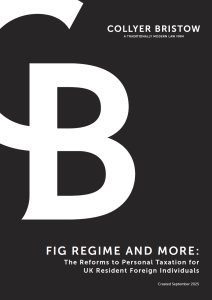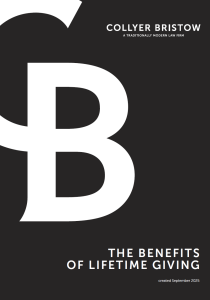
The Team
Our lawyers have the expertise and experience to provide you with creative, personalised solutions in a clear and understandable way.
Our Publications
Discover a wealth of invaluable guidance in the form of guides and brochures written by our expert lawyers.
Does your Will need updating?
With 10 simple questions, discover whether you need to update your Will in order to protect your wishes.
About
What is a Will Trust?
Will Trust is an umbrella term. It describes any trust that is created by your will and activates upon your death. There are several types of Will Trust available and each one is suitable in a different situation. These include discretionary trusts, where trustees have broad discretion as to how much of the trust assets are paid to which beneficiary and when, and Immediate Post Death Interest.
Trusts (IPDI) are where the trustees must pay income to a specific beneficiary during their lifetime, but someone else is entitled to the assets and investments of the trust. As a first step, we will meet with you to understand your reasons for creating a trust and the people you wish to benefit from it. We can then help you decide which type of Will Trust is right for your particular circumstances.
How is a Will Trust created?
You declare the trust in your will: which will then go on to specify
- the assets or the proportion of your estate over which the trust applies
- who shall be the trustees and what shall be their powers
- who shall be the beneficiaries and what shall be their entitlements.
The trustee must have sufficient information to understand your wishes. We can make sure that your will meets these requirements and also advise on other key issues to consider.
Why should I make a Will Trust?
Will Trusts are a valuable estate planning tool? Most often, they are used to:
- provide you with more control over how your estate is distributed on death
- place conditions or restrictions on inheritance, such as age limits for when beneficiaries gain access to funds
- protect vulnerable persons, such as children or those lacking mental capacity, by specifying who should manage their finances until they reach a certain age
- name people who haven’t yet been born to be beneficiaries, such as future grandchildren and great-grandchildren
- set up a charitable trust so contributions can be made to your preferred causes
- avoid “sideways disinheritance” by making sure that a second (or subsequent) spouse is provided for during their lifetime while ensuring the estate is passed to the children of a previous relationship after their death
- minimise inheritance tax and take advantage of available tax relief
What are the disadvantages of using a Will Trust?
There are no obvious disadvantages in starting out with a flexible trust although advice should always be taken when the will is made so that full account is taken of your circumstances. It is important to select appropriate assets for the type of trust decided on and given that personal, financial and fiscal circumstances are susceptible to change to keep your will under review.
If the trust is an IPDI then it is looked through for the purposes of Inheritance Tax and the assets are currently treated for the purposes of that tax as if they belonged to the beneficiary entitled to enjoy them. Otherwise, there may be exit charges when distributions are made and a charge to Inheritance Tax at each 10-year anniversary, at the same rates as for lifetime trusts, if the trust is not brought to an end within two years of the death.
If you would like to discuss setting up a Will Trust or have any other questions about trusts and estate planning, please get in touch with our team. We are here to help.
Peter DanielPartner - Head of Private Wealth
+44 20 7468 7351+44 7879 842645peter.daniel@collyerbristow.com
Explore the nuances of some of the most common aspects of UK/USA cross-border tax and estate planning.
Spotlight
Trusts for business owners
For clients who own trading businesses, trusts can be useful succession and tax planning vehicles to ensure the preservation of our clients’ wealth. For example, it may be possible to transfer shares in a business into a trust free from inheritance tax, while also optimising the capital gains tax position.
Spotlight
Trusts for future generations
Where clients wish to provide for their children and grandchildren (e.g. for the provision of school fees), it can be prudent to create a trust of up to the available inheritance tax allowance (known as the nil rate band). There will be no inheritance tax on creation and a new trust of this type can be created every seven years. Also, if clients have surplus income, outright gifts or gifts into trust out of this surplus income can be made which are completely exempt from inheritance tax.
Spotlight
Wills for business owners
We advise clients who own businesses on how best to structure their will so as to make use of business property relief in passing assets down to future generations. A will trust to hold business assets is often flexible and tax-efficient, whether the intention is that the business continues to be owned and run by the family, or the business will be sold.
Quick glance: publications
- FIG Regime and more: The Reforms to Personal Taxation for UK Resident Foreign IndividualsWhat the new rules mean for UK resident foreign taxpayers - What the new rules mean for UK resident foreign taxpayers
- The Benefits Of Lifetime GivingAn expert guide to tax-efficient charitable giving - An expert guide to tax-efficient charitable giving
- Planning with crypto assets
- Lifetime Giving Handbook
- Lifetime Giving | Trusts and School FeesA guide to tax efficient arrangements - A guide to tax efficient arrangements
- Lasting powers of attorney
- A Question of Capacity
- How are your cryptoassets taxed?
- Decrypting a digital world
- Why might a trust be of benefit?
Will Trust Publications
FIG Regime and more: The Reforms to Personal Taxation for UK Resident Foreign IndividualsWhat the new rules mean for UK resident foreign taxpayers - What the new rules mean for UK resident foreign taxpayers
From 6 April 2025, UK tax for foreign residents is based solely on tax residence, not domicile. The simplified system affects income, capital gains, and inheritance tax, offering some residents up to four years to shelter non-UK income and gains.
The Benefits Of Lifetime GivingAn expert guide to tax-efficient charitable giving - An expert guide to tax-efficient charitable giving
At Collyer Bristow, we help individuals, families, and trustees plan strategically to maximise the impact of their charitable giving while preserving and protecting wealth. Charitable donations, whether made during your lifetime or through your Will, can provide significant opportunities to reduce tax liabilities and create a lasting legacy.
Our latest guide, The Benefits of Lifetime Giving, explores the full range of options available and illustrates how to integrate charitable donations into a broader estate planning strategy.
Planning with crypto assets
It is increasingly important for individuals to understand how crypto assets are taxed, both in life and on death, and ensure the consideration of crypto assets in succession planning.
Lifetime Giving Handbook
We have prepared a handbook to answer the most pressing and common lifetime giving questions and issues including; giving property to the next generation, gifts to vulnerable individuals, how best to fulfil an individual’s philanthropic ambitions, foreign gifts and the tax benefits associated with gifts of art.
Lifetime Giving | Trusts and School FeesA guide to tax efficient arrangements - A guide to tax efficient arrangements
Many families contend with paying school fees running into hundreds of thousands of pounds per child over the course of their education. This guide examines some tax efficient arrangements that other family members (typically grandparents) can use to contribute to these costs.
Lasting powers of attorney
A guide on making an LPA covering everything you need to know when considering giving another person certain authority to make decisions, in circumstances where you no longer have the mental capacity to do so on your own.
A Question of Capacity
This guide, A Question of Capacity, outlines key points for consideration to ensure business owners put their businesses in the best position possible in the event of your incapacity.
How are your cryptoassets taxed?
Guidance for individuals who hold cryptoassets, explaining what taxes they may need to pay, and what records they need to keep. Also included is information for businesses and companies about the tax treatment of cryptoasset transactions.
Decrypting a digital world
An overview of some of the key areas of interest in relation to cryptoassets, their legal treatment in the UK, and how they should be considered in tax and estate planning.
Why might a trust be of benefit?
A guide considering the many reasons and many circumstances where a trust might be of benefit.
Will Trust insights
Podcasts
The Role of Financial Coaching in Family Disputes with Kristin CunliffeThe Role of Financial Coaching in Family Disputes with Kristin Cunliffe
Listen now
Shorter Reads
IHT on UK farming land and buildings held through offshore companiesIHT on UK farming land and buildings held through offshore companies
Read more
Podcasts
Common Law Marriage: What Cohabiting Couples Need to KnowCommon Law Marriage: What Cohabiting Couples Need to Know
Listen now
Podcasts
Episode 1: Introducing LawTorn – Exploring Family and Inheritance DisputesEpisode 1: Introducing LawTorn – Exploring Family and Inheritance Disputes
Listen now
Longer Reads
Why early estate planning is key to effective generational wealth transferWhy early estate planning is key to effective generational wealth transfer
Read more
Longer Reads
Lessons from Angela Rayner’s SDLT errorsLessons from Angela Rayner’s SDLT errors
Read more
News
Farmers and business owners seek Judicial Review of Inheritance Tax Changes to Agricultural/Business Property ReliefFarmers and business owners seek Judicial Review of Inheritance Tax Changes to Agricultural/Business Property Relief
Read more
Shorter Reads
Daughter who cared for ageing mother wins High Court claim for reimbursement from estateDaughter who cared for ageing mother wins High Court claim for reimbursement from estate
Read more
Videos
Power of Attorney UK: Everything You Need to Know | Collyer Bristow Legal GuidePower of Attorney UK: Everything You Need to Know | Collyer Bristow Legal Guide
Watch now
Shorter Reads
2025 Spring Statement2025 Spring Statement
Read more
Shorter Reads
‘Long Term Residence’ in the UK: Tax Consequences for International Private Clients‘Long Term Residence’ in the UK: Tax Consequences for International Private Clients
Read more
Shorter Reads
Statutory Residence TestStatutory Residence Test
Read more
You might also like
Need some more information? Make an enquiry below
Will Trust key contacts
- Peter
DanielPartner - Head of Private Wealth
Talk to Peter about UK trusts, tax & estate planning, International trusts, tax & estate planning, Private wealth, Probate and US/UK Tax & estate planning
Will Trust
Created by your will and taking effect on death, a Will Trust can be an effective way of passing wealth to your loved ones while avoiding unnecessary Inheritance Tax.
The Team
Our lawyers have the expertise and experience to provide you with creative, personalised solutions in a clear and understandable way.
Our Publications
Discover a wealth of invaluable guidance in the form of guides and brochures written by our expert lawyers.
Does your Will need updating?
With 10 simple questions, discover whether you need to update your Will in order to protect your wishes.
What is a Will Trust?
Will Trust is an umbrella term. It describes any trust that is created by your will and activates upon your death. There are several types of Will Trust available and each one is suitable in a different situation. These include discretionary trusts, where trustees have broad discretion as to how much of the trust assets are paid to which beneficiary and when, and Immediate Post Death Interest.
Trusts (IPDI) are where the trustees must pay income to a specific beneficiary during their lifetime, but someone else is entitled to the assets and investments of the trust. As a first step, we will meet with you to understand your reasons for creating a trust and the people you wish to benefit from it. We can then help you decide which type of Will Trust is right for your particular circumstances.
How is a Will Trust created?
You declare the trust in your will: which will then go on to specify
- the assets or the proportion of your estate over which the trust applies
- who shall be the trustees and what shall be their powers
- who shall be the beneficiaries and what shall be their entitlements.
The trustee must have sufficient information to understand your wishes. We can make sure that your will meets these requirements and also advise on other key issues to consider.
Why should I make a Will Trust?
Will Trusts are a valuable estate planning tool? Most often, they are used to:
- provide you with more control over how your estate is distributed on death
- place conditions or restrictions on inheritance, such as age limits for when beneficiaries gain access to funds
- protect vulnerable persons, such as children or those lacking mental capacity, by specifying who should manage their finances until they reach a certain age
- name people who haven’t yet been born to be beneficiaries, such as future grandchildren and great-grandchildren
- set up a charitable trust so contributions can be made to your preferred causes
- avoid “sideways disinheritance” by making sure that a second (or subsequent) spouse is provided for during their lifetime while ensuring the estate is passed to the children of a previous relationship after their death
- minimise inheritance tax and take advantage of available tax relief
What are the disadvantages of using a Will Trust?
There are no obvious disadvantages in starting out with a flexible trust although advice should always be taken when the will is made so that full account is taken of your circumstances. It is important to select appropriate assets for the type of trust decided on and given that personal, financial and fiscal circumstances are susceptible to change to keep your will under review.
If the trust is an IPDI then it is looked through for the purposes of Inheritance Tax and the assets are currently treated for the purposes of that tax as if they belonged to the beneficiary entitled to enjoy them. Otherwise, there may be exit charges when distributions are made and a charge to Inheritance Tax at each 10-year anniversary, at the same rates as for lifetime trusts, if the trust is not brought to an end within two years of the death.
If you would like to discuss setting up a Will Trust or have any other questions about trusts and estate planning, please get in touch with our team. We are here to help.
Peter DanielPartner - Head of Private Wealth
View Peter Daniel's profileCameron CreesAssociate
View Cameron Crees's profileCarly RussellPartner
View Carly Russell's profileCharlie FowlerPartner
View Charlie Fowler's profileEmily MalvasoSenior Associate
View Emily Malvaso's profileExplore the nuances of some of the most common aspects of UK/USA cross-border tax and estate planning.
SPOTLIGHT
Trusts for business ownersopen
For clients who own trading businesses, trusts can be useful succession and tax planning vehicles to ensure the preservation of our clients’ wealth. For example, it may be possible to transfer shares in a business into a trust free from inheritance tax, while also optimising the capital gains tax position.
Trusts for future generationsopen
Where clients wish to provide for their children and grandchildren (e.g. for the provision of school fees), it can be prudent to create a trust of up to the available inheritance tax allowance (known as the nil rate band). There will be no inheritance tax on creation and a new trust of this type can be created every seven years. Also, if clients have surplus income, outright gifts or gifts into trust out of this surplus income can be made which are completely exempt from inheritance tax.
Wills for business ownersopen
We advise clients who own businesses on how best to structure their will so as to make use of business property relief in passing assets down to future generations. A will trust to hold business assets is often flexible and tax-efficient, whether the intention is that the business continues to be owned and run by the family, or the business will be sold.
Will Trust Publications
- FIG Regime and more: The Reforms to Personal Taxation for UK Resident Foreign IndividualsWhat the new rules mean for UK resident foreign taxpayers - What the new rules mean for UK resident foreign taxpayers
- The Benefits Of Lifetime GivingAn expert guide to tax-efficient charitable giving - An expert guide to tax-efficient charitable giving
- Planning with crypto assets
- Lifetime Giving Handbook
- Lifetime Giving | Trusts and School FeesA guide to tax efficient arrangements - A guide to tax efficient arrangements
- Lasting powers of attorney
- A Question of Capacity
- How are your cryptoassets taxed?
- Decrypting a digital world
- Why might a trust be of benefit?
Will Trust insights
Podcasts
The Role of Financial Coaching in Family Disputes with Kristin CunliffeThe Role of Financial Coaching in Family Disputes with Kristin Cunliffe
Listen now
Shorter Reads
IHT on UK farming land and buildings held through offshore companiesIHT on UK farming land and buildings held through offshore companies
Read more
Podcasts
Common Law Marriage: What Cohabiting Couples Need to KnowCommon Law Marriage: What Cohabiting Couples Need to Know
Listen now
Podcasts
Episode 1: Introducing LawTorn – Exploring Family and Inheritance DisputesEpisode 1: Introducing LawTorn – Exploring Family and Inheritance Disputes
Listen now
Longer Reads
Why early estate planning is key to effective generational wealth transferWhy early estate planning is key to effective generational wealth transfer
Read more
Longer Reads
Lessons from Angela Rayner’s SDLT errorsLessons from Angela Rayner’s SDLT errors
Read more
News
Farmers and business owners seek Judicial Review of Inheritance Tax Changes to Agricultural/Business Property ReliefFarmers and business owners seek Judicial Review of Inheritance Tax Changes to Agricultural/Business Property Relief
Read more
Shorter Reads
Daughter who cared for ageing mother wins High Court claim for reimbursement from estateDaughter who cared for ageing mother wins High Court claim for reimbursement from estate
Read more
Videos
Power of Attorney UK: Everything You Need to Know | Collyer Bristow Legal GuidePower of Attorney UK: Everything You Need to Know | Collyer Bristow Legal Guide
Watch now
Shorter Reads
2025 Spring Statement2025 Spring Statement
Read more
Shorter Reads
‘Long Term Residence’ in the UK: Tax Consequences for International Private Clients‘Long Term Residence’ in the UK: Tax Consequences for International Private Clients
Read more
Shorter Reads
Statutory Residence TestStatutory Residence Test
Read more
Need some more information? Make an enquiry below.
Message us on WhatsApp (calling not available)
Please note that Collyer Bristow provides this service during office hours for general information and enquiries only and that no legal or other professional advice will be provided over the WhatsApp platform. Please also note that if you choose to use this platform your personal data is likely to be processed outside the UK and EEA, including in the US. Appropriate legal or other professional opinion should be taken before taking or omitting to take any action in respect of any specific problem. Collyer Bristow LLP accepts no liability for any loss or damage which may arise from reliance on information provided. All information will be deleted immediately upon completion of a conversation.
Close

































